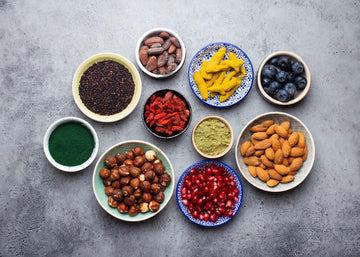Superfoods are foods that are particularly rich in nutrients and offer numerous health benefits. They can help supply the body with essential vitamins, minerals, antioxidants and other important nutrients. Here are the top 10 superfoods you should incorporate into your diet to optimize your health.
1. Chia seeds
Chia seeds are small but mighty seeds that are rich in omega-3 fatty acids, fiber, protein and antioxidants. These nutrients support heart health, aid digestion and provide sustained energy.
• How to use: Sprinkle chia seeds over cereal, yogurt, or mix them into smoothies. They can also be soaked in water to form a gel-like consistency, making them a great vegan egg substitute.
2. Kale
Kale is one of the most nutrient-dense foods in the world. It is rich in vitamins A, C and K, folate, calcium and iron. Its high antioxidant concentration helps protect the body from free radical damage.
• Use: Kale can be enjoyed in salads, smoothies or as a crunchy snack (kale chips). It also tastes great in soups and stews.
3. Quinoa
Quinoa is a high-protein pseudocereal that contains all nine essential amino acids, making it a complete protein source. It is also rich in fiber, iron and magnesium.
• Uses: Quinoa can be used as a base for salads, as a side dish or as a breakfast porridge. It is a versatile and nutrient-rich alternative to rice or pasta.
4. Blueberries
Blueberries are small, sweet fruits that are rich in antioxidants, particularly anthocyanins. These antioxidants help reduce inflammation and support cognitive function.
• Use: Enjoy blueberries fresh, frozen or dried. They are ideal for smoothies, salads, cereals or as a snack between meals.
5. Avocado
Avocados are rich in healthy monounsaturated fats that can protect the heart. They also provide a good amount of fiber, potassium and vitamins such as vitamin E and B vitamins.
• Use: Avocados are versatile. They can be used in smoothies, salads, as a spread or as a base for guacamole.
6. Flaxseed
Flaxseeds are an excellent source of omega-3 fatty acids, fiber and lignans, which act as plant-based antioxidants. They support heart health and may aid digestion.
• How to use: Grind flaxseeds before consumption to ensure optimal absorption of nutrients. They can be used in smoothies, yogurt, baked goods or as an egg substitute in vegan recipes.
7. Almonds
Almonds are rich in healthy fats, protein, fiber, vitamin E and magnesium. Regular consumption of almonds can reduce the risk of heart disease and support blood sugar regulation.
• Use: Almonds can be enjoyed raw, roasted, as almond butter or as an ingredient in salads, cereals and baked goods.
8. Turmeric
Turmeric is a bright yellow spice that contains the powerful anti-inflammatory compound curcumin. It may help reduce inflammation and promote brain and joint health.
• Uses: Turmeric can be used in curries, soups, smoothies or as an ingredient in golden milk. For better absorption of curcumin, it should be combined with black pepper.
9. Spirulina
Spirulina is a blue-green algae rich in proteins, vitamins, minerals and antioxidants. It supports the immune system and provides a variety of nutrients important for overall health.
• Usage: Spirulina can be taken in smoothies, juices or as a supplement in powder or tablet form.
10. Sweet potatoes
Sweet potatoes are rich in beta-carotene, which the body converts into vitamin A, as well as fiber, vitamin C and potassium. They support eye health and provide a slow-release source of energy.
• Uses: Sweet potatoes can be baked, boiled, mashed, or used in soups and stews. They also make a great alternative to regular potatoes in chips or casseroles.
Conclusion
Incorporating these top 10 superfoods into your diet can help you optimize your health, increase energy, and improve overall well-being. Not only do these nutrient-dense foods provide a variety of health benefits, but they are also versatile and tasty to use in many recipes. Start incorporating these superfoods into your meals today and reap the natural powers they offer.





